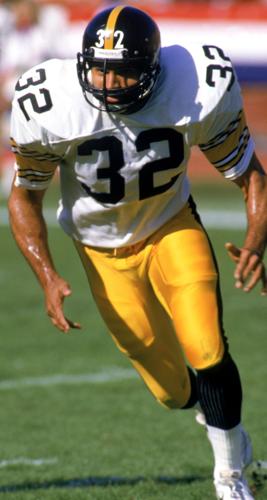Franco Harris
Teams
Pittsburgh Steelers (1972-1983)
Seattle Seahawks (1984)
Playoffs
Appearances - 11 (1972,1973,1974,1975,1976,1977,1978,1979,1982,1983,1984)
Conf Champ Games - 6 (1972,1974,1975,1976,1978,1979)
Super Bowls - 4 (1974,1975,1978,1979)
Championships - 4 (1974,1975,1978,1979)
Awards and Honors
Offensive Rookie of the Year - 1972
All-Pro First Team - 1 (1977)
All-Pro Second Team - 2 (1972,1975)
Pro Bowl - 9 (1972,1973,1974,1975,1976,1977,1978,1979,1980)
Super Bowl MVP - 1 (1974)
Hall of Fame - 1990
All-Time Ranks
Rushing Touchdowns - #11
Rushing Yards - #15
Total Touchdowns - #23
Scrimmage Yards - #31
Rushing Yards per Game - #42
League Leads
Rushing Yards (#2-1975, #4-1977, #5-1974, #6-1972, #7-1976,1978, #8-1979, #9-1982)
Rushing Touchdowns (#1-1976, #3-1972,1977, #6-1975,1979, #9-1978)
Yards per Rush (#2-1972, #4-1974, #5-1975, #9-1982)
Rushing Yards per Game (#2-1975, #3-1974, #4-1977, #6-1979, #8-1972,1976,1978)
Total Touchdowns (#1-1976, #4-1977, #7-1972, #8-1975,1979)
Scrimmage Yards (#4-1975, #8-1974, #9-1977, #10-1979)
Yards per Touch (#6-1972, #9-1974)
During his 3 seasons at Penn State, Franco Harris was used mostly as a blocking back, never gaining 700 rushing yards in a season, but he was still drafted by the Pittsburgh Steelers in the first round of the 1972 NFL Draft.
Harris was named the league's Offensive Rookie of the Year in 1972 after rushing for 1055 yards and 10 touchdowns while averaging 5.6 yards per carry, which was #2 in the league. Pittsburgh made the playoffs that year for the second time in their history, and they got their first-ever playoff win when Harris caught the "Immaculate Reception," which gave them an upset win over the Raiders.
Harris was switched to fullback after his amazing rookie season, and there was an adjustment period. He gained only 698 yards in his second season, and only earned 3.7 yards per carry. He figured it out by 1974, when he gained 1006 yards and got 4.8 yards per carry, putting him back among the best backs in the league.
Harris helped lead the Steelers to their first-ever Super Bowl that year, and he was named the game's MVP after rushing for 158 yards and a touchdown as Pittsburgh beat Minnesota 16-6. He gained more yards by himself than the entire Vikings team, and had nearly half of Pittsburgh's total yards in the game.
He set a career-high with 1246 rushing yards in 1975, and also scored 10 touchdowns on the ground, while leading the Steelers to the Super Bowl again. He rushed for 82 yards in the championship game as the Steelers repeated as champions, defeating the Cowboys 21-17.
In 1976, Harris set a career-high and led the league by scoring 14 rushing touchdowns, but his per carry average dropped down to 3.9, and it would remain around that level for the rest of his career. The Steelers fell one game short of the Super Bowl that year, stopping them from becoming the first team every to win 3 in a row.
He was named to the All-Pro First Team in 1977 for the only time in his career, but his efficiency continued to drop. He averaged only 3.5 yards per carry in 1978, but when the Super Bowl rolled around, he gained 68 yards and scored a touchdown as the Steelers beat Dallas again, this time 35-31.
In 1979, the Steelers won their 4th Super Bowl in 6 years, and though Harris only gained 46 yards on 20 carries, he scored 2 touchdowns, and Pittsburgh was victorious over the Rams 31-19. Over the next 3 seasons, his rushing totals dropped off, and he failed to reach 1000 yards in any of those seasons, but in 1983, with the all-time rushing record starting to come into sight, he racked up 1007 yards on only 3.6 yards per carry.
After that season, he asked for another contract so that he could try to break Jim Brown's all-time rushing mark with the Steelers, but they could see that he was on the downside of his career, and he instead signed with the Seahawks. He played only 8 games for Seattle and gained only 170 before retiring short of the mark.
Early in his career, Harris was a very efficient back who was a big part of 2 champions. Later, he became a back who ate up a lot of yards slowly, and helped his team win 2 more titles. He only led the league in any category once, touchdowns in 1976, but he won a Super Bowl MVP, and is still #15 in all-time rushing yards 40 years after his retirement, and he is definitely one of the greatest to ever play the game.



No comments:
Post a Comment